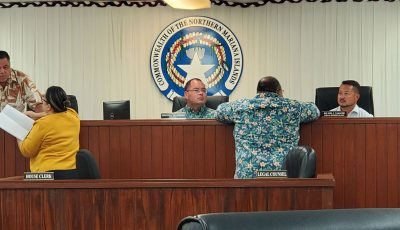Marijuana bill sent back to Senate
A House committee, during a continuation of its previous meeting yesterday that was recessed, gave the go signal to discuss the cannabis bill introduced in the Senate instead of killing the bill and reintroducing it as a House bill.
The House Judicial and Governmental Operations Committee during the continuation of their June 21, 2018 meeting voted to adapt yesterday the amendments made to Sen. Sixto Igisomar’s (R-Saipan) Senate Bill 20-62.
Discussions of reintroducing another cannabis bill to incorporate the revenue-generating sections previously introduced in the original version of S.B. 20-62, which was removed during a previous JGO meeting, came up when sections of the bill sought to tax possible vendors of cannabis were deemed as revenue-generating provisions.
During the June 21, 2018 meeting of the committee, legal counsel John Cool was tasked to provide a written statement on his position of fines in S.B. 20-62 not generating revenue.
JGO, led by Rep. Ivan A. Blanco (R-Saipan), also tasked Cool to look into other jurisdictions and their cannabis bills for further review.
Yesterday, Cool reaffirmed his position saying that fines are not considered revenue, despite Rep. Blas “B.J.” Jonathan Attao (Ind-Saipan) believing otherwise.
Rep. Francisco Aguon (R-Saipan) then moved for the committee to adapt the several amendments made to S.B. 20-62, which include changing the period allotted for Gov. Ralph DLG Torres to appoint commissioners from 90 days to 30 days; lift the ban on appointing commissioners and executive directors who have had criminal or police records—except for traffic violations—within the last 15 years to serve; add a provision that only allows cannabis licensees to have long-term interests on the licensed premises; and lift provisions that override public and private agency policies against the termination and hiring of individuals who have failed a drug test, among many others.
The committee noted that several of the amendments came from the Public School System, the Commonwealth Healthcare Corp., the Governor’s Office, and other public and private input.
“A lot of hard work went into this,” said Blanco in an interview. “We have tasked the House legal counsel [Cool] to look carefully look into the penalty clause—if it’s revenue-generating or not. We gave him time to look into other cases in the U.S. He did, and both legal counsels came out [agreeing] that it is not a revenue-generating clause.”
Attao and minority leader Rep. Edmund Villagomez (Ind-Saipan) both voted against the adoption of the bill.
S.B. 20-62 heads back to the Senate for action.



























